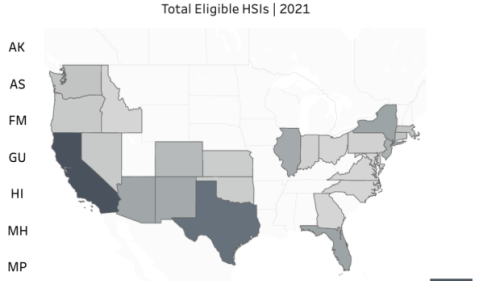In response to inaccurate and inconsistent data used to identify minority-serving institutions (MSIs) for funding and analysis, researchers have established a database with recommendations for uniform and accurate MSI classifications.
The MSI Data Project, launched in March 2023, offers dashboards with data on MSI eligibility, funding status, institutional characteristics, enrollment, and graduation metrics for MSIs from 2017-2021. MSIs are postsecondary colleges and universities that offer resources and support for racial and ethnic minorities or that have a particular percentage of racial and ethnic minorities enrolled.

“Our goal in constructing a longitudinal MSI database is to advance a standardized and uniform definition and typology for MSIs. Our hope is for researchers to utilize our database to conduct more precise research on and with MSIs, and for MSI leaders, advocates, and policymakers to use this body of research, as well as our data dashboards, to make better-informed decisions that promote equitable educational outcomes for students,” said Mike Hoa Nguyen (pictured), assistant professor of education at NYU Steinhardt and principal investigator of the MSI Data Project.
The MSI Data Project accompanies a newly published article in Educational Researcher authored by Nguyen and two of the project’s co-creators, Joseph Ramirez of the California Institute of Technology and Sophia Laderman of the State Higher Education Executive Officers Association (SHEEO). The fourth co-creator for the database is Kelsey Heckert of SHEEO.
The authors state that researchers, policymakers, advocacy organizations, and universities have classified MSIs in inconsistent ways that create inaccurate datasets and studies. “This has led to widespread differences in findings, with serious and potentially harmful implications for policy and practice,” they write.
To ensure consistency in how MSIs are defined, the authors offer a classification system with several recommendations, including identifying whether institutions are eligible for MSI status or receive funding as an MSI by the US Department of Education; identifying the timeframe for when an institution is identified as an MSI for those whose status can change based on enrollment; and identifying each category an MSI falls under if meeting dual or multiple designations.
Their recommended classifications are all incorporated into the MSI Data Project, which offers data on the 11 MSI classifications identified by the US Department of Education:
- Asian American and Native American Pacific Islander-Serving Institutions (AANAPISI)
- Alaska Native and Native Hawaiian Serving Institutions (ANNHSI)
- Hispanic-Serving Institutions (HSI)
- Hispanic-Serving Institutions STEM (HSI STEM)
- Historically Black Colleges and Universities (HBCU)
- Historically Black Colleges and Universities Graduate Institutions (HBGI)
- Historically Black Colleges and Universities Masters Institutions (HBCU Masters)
- Native American-Serving Nontribal Institutions (NASNTI)
- Predominantly Black Institutions (PBI)
- Promoting Postbaccalaureate Opportunities for Hispanic Americans (PPOHA)
- Tribally Controlled Colleges and Universities (TCCU)
A user interested in information on Hispanic-Serving Institutions in the US, for example, can use the interactive dashboard to find that in 2021, there were 219 HSIs that received funding from the US Department of Education, but 462 HSIs that were eligible for funding.

Hispanic-Serving Institutions across the United States in 2021.
“Moving forward, we plan to include data for earlier years so that users can explore how MSI funding and eligibility status have changed and expanded over time. We will also add additional dashboards which will allow users to look up their institution and learn about an individual institution’s MSI eligibility, status, and history across each of the designations,” said Sophia Laderman, associate vice president at SHEEO and co-principal investigator of the MSI Data Project. “In addition, we are excited to significantly expand our data offerings by including funding amounts each MSI receives from the US Department of Education.”
The MSI Data Project was funded and supported by The Kresge Foundation, SHEEO, New York University, and the University of Denver.
Related Articles
Affirmative Action Event Highlights Role of Researchers in Informing Education Policy
The event, hosted by the NYU Steinhardt Institute for Higher Education Policy, included remarks by Assistant Professor of Education Mike Hoa Nguyen.


